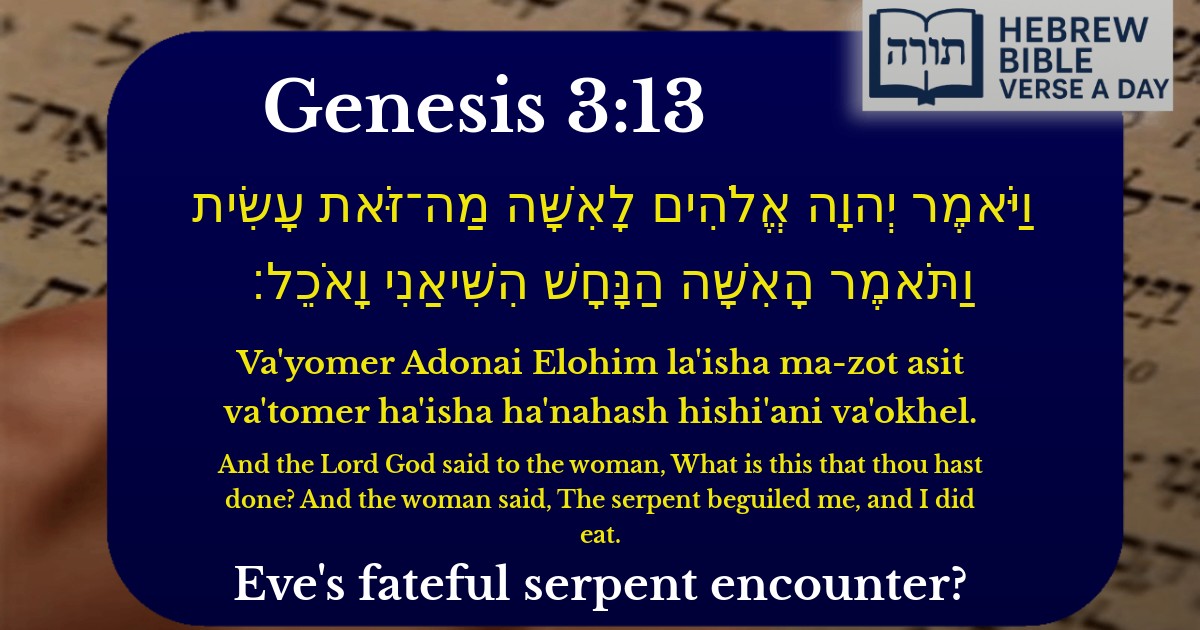Join Our Newsletter To Be Informed When New Videos Are Posted
Join the thousands of fellow Studends who rely on our videos to learn how to read the bible in Hebrew for free!
Hebrew Text
וַיֹּאמֶר יְהוָה אֱלֹהִים לָאִשָּׁה מַה־זֹּאת עָשִׂית וַתֹּאמֶר הָאִשָּׁה הַנָּחָשׁ הִשִּׁיאַנִי וָאֹכֵל׃
English Translation
And the Lord God said to the woman, What is this that thou hast done? And the woman said, The serpent beguiled me, and I did eat.
Transliteration
Va'yomer Adonai Elohim la'isha ma-zot asit va'tomer ha'isha ha'nahash hishi'ani va'okhel.
Hebrew Leining Text
וַיֹּ֨אמֶר יְהֹוָ֧ה אֱלֹהִ֛ים לָאִשָּׁ֖ה מַה־זֹּ֣את עָשִׂ֑ית וַתֹּ֙אמֶר֙ הָֽאִשָּׁ֔ה הַנָּחָ֥שׁ הִשִּׁיאַ֖נִי וָאֹכֵֽל׃
וַיֹּ֨אמֶר יְהֹוָ֧ה אֱלֹהִ֛ים לָאִשָּׁ֖ה מַה־זֹּ֣את עָשִׂ֑ית וַתֹּ֙אמֶר֙ הָֽאִשָּׁ֔ה הַנָּחָ֥שׁ הִשִּׁיאַ֖נִי וָאֹכֵֽל׃
🎵 Listen to leining
Parasha Commentary
📚 Talmud Citations
This verse is quoted in the Talmud.
📖 Avodah Zarah 5b
The verse is referenced in a discussion about the nature of temptation and sin, particularly in the context of the serpent's deception of Eve.
📖 Sanhedrin 29a
The verse is cited in a discussion about the consequences of deception and the accountability of individuals for their actions.
📖 Sotah 9b
The verse is mentioned in the context of discussing the role of the serpent in the fall of man and the subsequent curses.


Divine Inquiry and Human Response
The verse (Bereshit 3:13) describes Hashem's questioning of Chava (Eve) after she and Adam ate from the Tree of Knowledge. Rashi explains that Hashem's question, "What is this that you have done?" was not for His own understanding, but rather to give Chava an opportunity to confess and repent. This reflects the middah (attribute) of Hashem's patience and desire for teshuvah (repentance).
Chava's Defense
Chava responds by blaming the serpent: "The serpent beguiled me, and I did eat." The Midrash (Bereshit Rabbah 19:12) notes that Chava's response contains an element of evasion—she shifts blame rather than taking full responsibility. Rambam (Hilchot Teshuvah 1:1) teaches that true teshuvah requires acknowledging one's sin without excuses.
The Nature of the Serpent's Deception
The term "הִשִּׁיאַנִי" (hishiani - beguiled) is analyzed by commentators:
Lessons in Accountability
The Gemara (Avodah Zarah 5a) derives from this episode that one should not shift blame for their transgressions. The Maharal (Gur Aryeh) emphasizes that while external influences exist, ultimate responsibility lies with the individual. This principle becomes foundational in Jewish thought regarding free will and moral accountability.
Theological Implications
The exchange demonstrates: